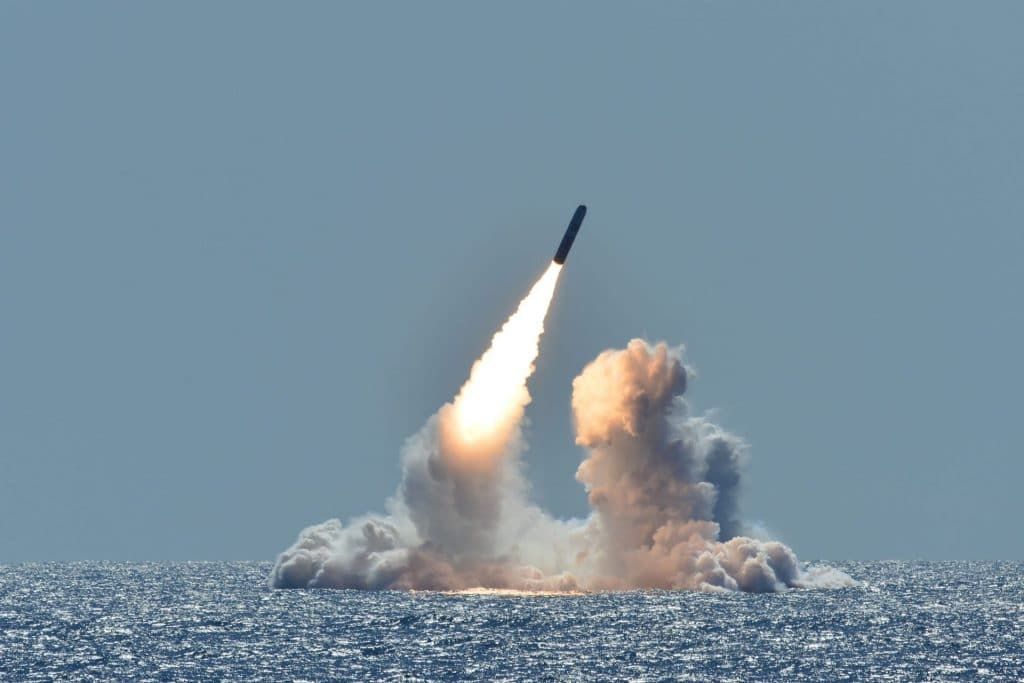The six best nuclear risk stories of 2019
By Bulletin Staff | December 30, 2019
 An unarmed D5 II Trident missile test, 2008. Photo credit: U.S. Navy
An unarmed D5 II Trident missile test, 2008. Photo credit: U.S. Navy
2019 was full of surprising—and terrifying—nuclear news. To list a few of the major events: A crisis between India and Pakistan brought two nuclear-armed countries to the brink of war; Donald Trump met Kim Jong Un twice but made no diplomatic progress on North Korean denuclearization; Russia tried to cover up a mysterious explosion on its northern coast that prompted near-endless speculation about its efforts to build a nuclear-powered cruise missile; the United States formally withdrew from the Intermediate-range Nuclear Forces Treaty and resumed testing missiles that would have been banned under the treaty; and Iran, after nearly goading the United States into a war over the summer, settled into a series of steady, deliberate breaches to its commitments under the nuclear deal that was inked in 2015.
A wide array of experts contributed valuable stories to help Bulletin readers make sense of these major events. While that coverage was superb and merits reading and even re-reading, the list below takes a different tack. It is composed of articles that either look back to generate some historical perspective or look forward to a brighter, less dangerous future.
A new, hopeful moment for US nuclear policy
By Joe Cirincione
The 2020 National Defense Authorization Act, passed by Congress in December, will allow the Trump administration’s nuclear modernization priorities, including the deployment of a low-yield nuclear warhead, to continue apace. But all of the hopeful trends that Joe Cirincione identified earlier in the year still hold up—and may even gain strength in 2020.
Trinity: “The most significant hazard of the entire Manhattan Project”
By Kathleen Tucker and Robert Alvarez
For the past several years, the controversy over radioactive fallout from the world’s first atomic bomb explosion in Alamogordo, New Mexico on July 16, 1945—code-named Trinity—has intensified. Over time, it has become increasingly clear that the public was put in harm’s way not only because of US government negligence in conducting an exceedingly dangerous experiment but because of its participation in a coverup of the results.
The entwined Cold War roots of missile defense and climate geoengineering
By Jurgen Scheffran
Nuclear weapons and global warming stand out as two principal threats to the survival of humanity. In each of these existential cases, two strategies born during the Cold War years are competing. One is to abandon the systems: eliminate nuclear weapons and drastically reduce carbon emissions. The second strategy is to continue business as usual, but develop new technologies to deal with the consequences.
Project Pluto and the trouble with Russia’s nuclear-powered cruise missile
By John Krzyzaniak
In the 1950s and ‘60s, the United States tried to build a nuclear-powered cruise missile. That effort, called Project Pluto, should serve as a cautionary tale for Russia today.
By Thomas Gaulkin
Many commentators thought that President Trump’s suggestion of using nuclear weapons to stop hurricanes was exceptionally delusional, but the sheer power of a nuclear explosion has inspired a lot of other bad ideas over the years.
We need a Green New Deal for nuclear weapons
By Matt Korda
As the 2020 Democratic primary season heats up, progressive voters will be looking for a candidate who has a bold vision for the future of US nuclear policy. Such a policy might mirror the Green New Deal for climate action.
Together, we make the world safer.
The Bulletin elevates expert voices above the noise. But as an independent nonprofit organization, our operations depend on the support of readers like you. Help us continue to deliver quality journalism that holds leaders accountable. Your support of our work at any level is important. In return, we promise our coverage will be understandable, influential, vigilant, solution-oriented, and fair-minded. Together we can make a difference.
Keywords: Cold War, India, Iran, North Korea, Pakistan, Russia, Trinity test, United States, best of 2019, nuclear risk
Topics: Analysis, Nuclear Risk, Nuclear Weapons














